|
|
|
Sort Order |
|
|
|
Items / Page
|
|
|
|
|
|
|
| Srl | Item |
| 1 |
ID:
069811
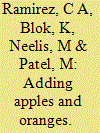

|
|
|
| 2 |
ID:
133456
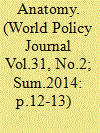

|
|
|
|
|
| Publication |
2014.
|
| Summary/Abstract |
Alternative currency is a privately developed form of money that is used as a substitute to national currency in designated areas. It is not regulated by national governments or banks. A familiar example is the e-currency, Bitcoin. However, Bitcoin is neither the only nor the oldest example of alternative money. The chiemgauer, Brixton pound, sardex, and the dam are examples of alternative money currently in use in Germany, England, Italy, and the Netherlands, respectively. The goal with these currencies is to promote the idea of spending locally. By keeping the currency within the designated area, the local economy is able to prosper regardless of the state of the national economy. This enables communities to establish local markets that are less affected by national trends
|
|
|
|
|
|
|
|
|
|
|
|
|
|
|
|
| 3 |
ID:
100462
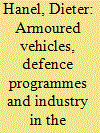

|
|
|
| 4 |
ID:
123475
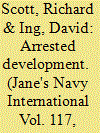

|
|
|
| 5 |
ID:
119610
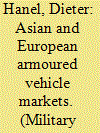

|
|
|
|
|
| Publication |
2012.
|
| Summary/Abstract |
With the start of the 21st century, the armed forces in Asia and Europe have been facing new demands as a result of radical changes in the security situation. In the foreseeable future, it is extremely unlikely that mentioned states will be threatened existentially by large - scale aggression using conventional means. Yet, safeguarding security and stability in both regions after the end of the Cold War and the need to meet global commitments for more exacting international conflict prevention and crisis management are leading to new tasks and demands placed on the Armed Forces.
|
|
|
|
|
|
|
|
|
|
|
|
|
|
|
|
| 6 |
ID:
100150
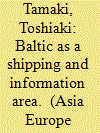

|
|
|
|
|
| Publication |
2010.
|
| Summary/Abstract |
In early modern times, the Netherlands imported grain from the Baltic, especially Poland, and re-exported it elsewhere in Europe. The Dutch shipping industry was extremely profitable, for transport costs were very high, and the number of Dutch ships was by far the largest among the European countries. Dutch prosperity was based on shipping of grain from the Baltic. Amsterdam was also a center of information because it was a port at which many ships stayed, and which attracted various merchants owing to its policy of religious tolerance. Much commercial information and know-how were accumulated in and spread from Amsterdam which contributed to the growth of the regional European economy from the Baltic because many merchants migrated to Northern Europe via the city, bringing with them the latest commercial techniques. Amsterdam therefore served as a core of Baltic integration in the early modern period, for it was a center of shipping and information.
|
|
|
|
|
|
|
|
|
|
|
|
|
|
|
|
| 7 |
ID:
162193
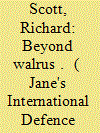

|
|
|
| 8 |
ID:
086740
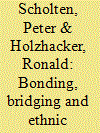

|
|
|
|
|
| Publication |
2009.
|
| Summary/Abstract |
The discourse on the integration of ethnic minorities in the Netherlands has undergone profound changes over the past few decades. This article analyses how discourses in politics and academia have revolved around changing emphases upon the social capital processes of 'bonding' of individuals within groups and 'bridging' of individuals to the wider society. Four episodes of discourse and policy may be distinguished: denial of being a country of immigration until the 1970s; the Minorities Policy in the 1980s; the Integration Policy of the 1990s; and the rise of a more assimilationist discourse after the turn of the millennium. The country thus began in the post-war period with a pluralist perspective toward integration rooted in the traditional religious and ideological 'pillarisation' of society, shifting first to a multicultural perspective, then to an integrationist and, finally, in the new millennium, to an assimilationist perspective.
|
|
|
|
|
|
|
|
|
|
|
|
|
|
|
|
| 9 |
ID:
139097
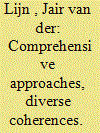

|
|
|
|
|
| Summary/Abstract |
Since 2000, international organisations such as the UN, NATO and the EU, but also countries, have started to apply what has been called the comprehensive approach to crisis management. This article unpacks this comprehensive approach implemented by the Dutch in Uruzgan province, Afghanistan. It first borrows and expands a conceptual framework developed by De Coning and Friis. Subsequently, it maps the different sorts of coherence in the mission by applying the framework. It shows how in practice there was not one single comprehensive approach, but many different forms of interaction between a number of organisational units. Each interaction had its own distinct issues and its own level of coherence. The level of coherence differed depending on the level at which the interaction took place – strategic at headquarters level versus operational at field level – and at what point in the mission it happened – in most cases it moved towards more cohesion.
|
|
|
|
|
|
|
|
|
|
|
|
|
|
|
|
| 10 |
ID:
113330
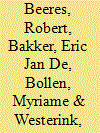

|
|
|
|
|
| Publication |
2012.
|
| Summary/Abstract |
This article examines the pattern of expenditures for national security of the Netherlands from 1990 until 2009. In 1990, military spending amounted to 2.7% of Gross Domestic Product (GDP). In 2009, almost two decades later, this ratio dropped by more than a full percent. During this period, the reduction of funds available for national security was in concurrence with the Dutch government's spending policies. The Netherlands Armed Forces (NAF) changed dramatically in terms of capabilities, size, equipment and personnel in this two-decade time span. Our investigative results indicate that in spite of this transition, no significant changes have been implemented since 1990 in how the Dutch defence budget is allocated for the Navy, Army and Air Force. Furthermore, the mix of expenditures for salaries, operations and maintenance, as well as those for capital investment, stayed roughly the same for the duration of the period studied.
|
|
|
|
|
|
|
|
|
|
|
|
|
|
|
|
| 11 |
ID:
181147
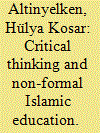

|
|
|
|
|
| Summary/Abstract |
Critical thinking is a highly valued skill in the twenty-first century, and its incorporation into formal school curricula as a core skill is nearly ubiquitous globally. It is considered imperative for educational quality, employability, competitiveness, and for promoting democratisation and social integration. While schools are tasked to promote critical thinking, non-formal Islamic education (NFIE) provided by mosques or by private organisations or tutors is often criticized for its emphasis on rote learning and memorisation, and for fostering an uncritical acceptance of authority. Based on interviews with 27 young adult alumni from four different Muslim communities in the Netherlands, this study seeks to explore the pedagogy of NFIE, with a focus on critical thinking. The accounts of young adults revealed that an emphasis on stimulating critical thinking was largely absent, and there were limited opportunities for interactions, questions, debating or challenging the authority of religious educators or Islamic texts. The traditional pedagogical approach, discouraging attitudes of educators and peers, lack of language proficiency, the young age of learners, and a perceived lack of need for critical deliberations were identified as key challenges. Young adults called for reforming the pedagogy of NFIE to allow for more reflexive, inquisitive and dialogical learning. Some argued that lack of critical deliberation would lead to weakness in the belief structures and faith of new generation Muslims in Europe, resulting in a sense of confusion and disorientation, and limited embodiment of Islamic principles.
|
|
|
|
|
|
|
|
|
|
|
|
|
|
|
|
| 12 |
ID:
069903
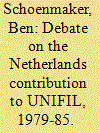

|
|
|
|
|
| Publication |
2005.
|
| Summary/Abstract |
This article examines the motives of the Dutch government for participating in UNIFIL in 1979 and for withdrawal after six years. The Dutch government was swayed mainly by considerations of national prestige. It decided to participate in UNIFIL as a way to improve the standing of the Netherlands in the world. From the outset, the Dutch government had little faith in the feasibility of the mandate and the usefulness of the operation. It would also have preferred to leave southern Lebanon as soon as possible, but the fear of losing international credibility and putting a spanner in the works of US diplomacy deterred it from taking that step.
|
|
|
|
|
|
|
|
|
|
|
|
|
|
|
|
| 13 |
ID:
100461
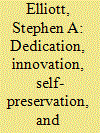

|
|
|
| 14 |
ID:
160970
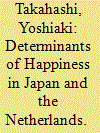

|
|
|
|
|
| Summary/Abstract |
It is often said that the Japanese happiness is lower than that of Europeans. However, sufficient discussion has yet to take place with consideration of differences in social forms as a background factor. In this study, therefore, by leveraging comparative international surveys, we empirically study and compare the factors that affect happiness in Japan and in the Netherlands, a country which has a higher happiness level than other European countries, from both macro (country level) and micro (individual level) perspectives.
|
|
|
|
|
|
|
|
|
|
|
|
|
|
|
|
| 15 |
ID:
099856
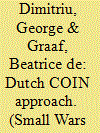

|
|
|
|
|
| Publication |
2010.
|
| Summary/Abstract |
Rarely has a military commitment led to such intense discussion in the Netherlands as the Task Force Uruzgan (TFU) mission in Afghanistan. In February 2010, the Netherlands' coalition government even collapsed after the two largest parties failed to agree on the withdrawal of Dutch troops from Afghanistan later this year. This article deals first of all with the difficult discussion over the Afghanistan mission of the TFU. The authors then subject three ISAF operations to close scrutiny. The authors provide some suggestions to help understand better this pivotal point in the execution of the whole operation and thus give a fuller picture of the Dutch counterinsurgency approach in Uruzgan.
|
|
|
|
|
|
|
|
|
|
|
|
|
|
|
|
| 16 |
ID:
072593
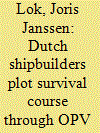

|
|
|
| 17 |
ID:
111986
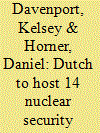

|
|
|
| 18 |
ID:
190901
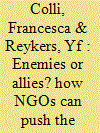

|
|
|
|
|
| Summary/Abstract |
This article examines the conditions under which non-governmental organisations (NGOs) gain access to defence administrations when campaigning for transparency around the use of military force. We theorise that gaining access in this traditionally secluded domain is a matter of supply and demand. NGOs can gain access through technical and political information, yet not without demand for these resources, dependent on the politicisation of concerns about the use of force. We focus on the activities of Airwars, an international NGO, and its campaign in the Netherlands (2015–20) to foster transparency about civilian casualties caused by Dutch airstrikes. Our analysis shows that their credible information about air strikes led to access to the defence administration and allowed them to effectively advocate for transparency, mediated by the politicisation of the issue through parliamentary and media attention. Our findings contribute both to the literature on NGO advocacy and to the field of civil-military relations.
|
|
|
|
|
|
|
|
|
|
|
|
|
|
|
|
| 19 |
ID:
101379
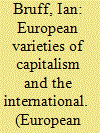

|
|
|
|
|
| Publication |
2010.
|
| Summary/Abstract |
This article develops a framework for analysing the distinctive national trajectories of European varieties of capitalism under the conditioning of 'the international'. It does so through a critical engagement with two prominent historical materialist literatures - transnational historical materialism and uneven and combined development. I argue that, in contrast to these contributions, a nationally-oriented perspective utilizing Antonio Gramsci's writings on 'common sense' has greater potential for narrowing the optic from broader concerns to fine-grained analysis. In particular, I focus on how articulations between the national and the international are constitutive of how humans make sense of the material basis for their existence.The Dutch variety of capitalism is then examined in order to demonstrate the advantages of utilizing this 'common sense' framework for political economy analysis.
|
|
|
|
|
|
|
|
|
|
|
|
|
|
|
|
| 20 |
ID:
127889
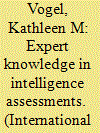

|
|
|
|
|
| Publication |
2013.
|
| Summary/Abstract |
In 2011, scientists in the Netherlands and Japan announced that they had created a modified variant of the H5N1 avian influenza virus that was transmissible via aerosol, raising fears of a new, highly lethal H5N1 virus that could cause a deadly global pandemic. Soon, government officials and the media were raising alarms about the wisdom of publishing such experimental methods and results in the open scientific literature. Their concerns sparked a large public controversy about the H5N1 experiments and their potential publication. In the midst of this controversy, U.S. intelligence analysts began assessing the potential security implications of the H5N1 manuscripts, including whether a terrorist, criminal, or state could easily replicate these experiments and create mutated viruses for bioweapons use. An in-depth look at this controversy reveals that, first, U.S. intelligence analysts do not have adequate social and material resources to identify and evaluate the tacit knowledge, or know-how, that underpins dual-use experiments such as those in the H5N1 case. Second, they lack dedicated structures and methods to understand the politics that characterize the use of technical expertise in such controversial biosecurity issues. Third, they require new types, structures, and uses of expert knowledge to enable them to make more informed and balanced assessments of biosecurity threats.
|
|
|
|
|
|
|
|
|
|
|
|
|
|
|
|
|
|
|
|
|